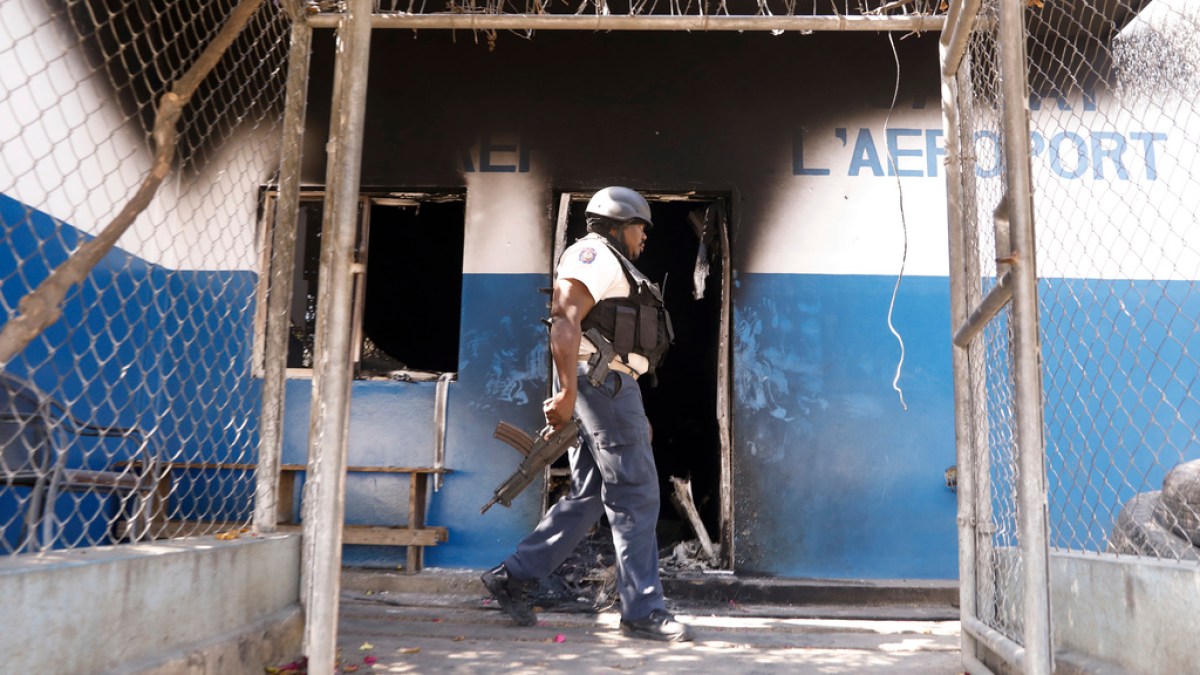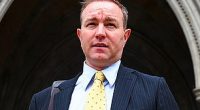
The proposal initially sparked an uproar. In October 2022, then-Haitian Prime Minister Ariel Henry and 18 top officials called on the international community to send a “specialised armed force” to help combat the spread of gang violence in Haiti.
But Haiti has struggled with a long, fraught history of foreign involvement — and the prospect of a new wave of outside interference was met with scepticism.
Now, experts say that public opinion is shifting in Haiti, as the violence continues to fester and Haiti’s already tenuous government is on the verge of yet another shake-up.
“In October 2022, most Haitians were against an international force,” said Pierre Esperance, executive director of Haiti’s National Human Rights Defense Network (RNDDH). “But today most Haitians will support it because the situation is worse, and they feel there are no other options.”
Still, the history of international involvement in Haiti casts such a long shadow that it continues to be a divisive subject — both among the Haitian people and the outside forces that would potentially be involved.
A new level of crisis
The instability in Haiti entered a new chapter this week when Prime Minister Henry — an unelected official who has been serving as de facto president — announced that he planned to resign.
The announcement came after mounting international pressure, as well as threats from the gangs themselves. One of the country’s most notorious gang leaders, Jimmy “Barbecue” Cherizier, told reporters that a “civil war” would erupt if the deeply unpopular Henry did not step down.
The calls for an international force to intervene arise from the acute nature of the situation, Esperance and other experts told Al Jazeera.
Gang violence has forced more than 362,000 Haitians from their home, largely in and around the capital of Port-au-Prince. The United Nations estimates that at least 34,000 of those have been displaced since the start of the year.
Armed groups have also taken control of roadways and other vital arteries around the country, limiting the flow of supplies. With high rates of poverty already driving malnutrition, the UN has warned the country is at risk of famine.
“The gangs control more than 95 percent of Port-au-Prince,” Esperance said. “Hospitals don’t have materials, there’s not enough drinking water, the supermarkets are almost empty. People are staying at home because it’s very dangerous.”
Will Kenya take the lead?
With gang violence at crisis levels and Haiti’s government in shambles, some Haitians are increasingly looking abroad for assistance.
An August poll released by the business alliance AGERCA and the consultancy DDG found that about 63 percent of Haitians supported the deployment of an “international force” to combat the gangs.
An even higher portion — 75 percent — said the Haitian police needed international support to reestablish order.
But countries like the United States and Canada have baulked at the prospect of helming such a force themselves, though they have offered to back other governments that might lead one.
In July 2023, Kenya announced it would be willing to deploy forces to Haiti and potentially lead a multinational security mission.
The UN Security Council threw its support behind the initiative, approving the Kenya-led mission. But the effort has since stalled, amid court challenges and other slowdowns.
In January, a Kenyan court ruled that deploying forces in Haiti would be “illegal and invalid”. And just last Tuesday, Kenyan officials said they would pause any deployment to Haiti until a new government was in place.
Jonathan Katz, the author of the book The Big Truck That Went By: How the World Came to Save Haiti and Left Behind a Disaster, told Al Jazeera that the international community’s hesitation to lead a mission to Haiti is a testament to the poor track record of past foreign interventions.
“These countries are saying, ‘We need to do this because we can’t think of any other solution,’” said Katz. “But nobody wants to do it themselves because every single one of these interventions throughout Haiti’s history have ended with significant egg on the face for everyone involved.”
‘A direct colonial occupation’
Since the early 1900s, there have been at least three direct interventions in Haiti, including a decades-long occupation by US forces.
That occupation lasted from 1915 to 1934 and was carried out in the name of restoring political stability after the assassination of then-President Vilbrun Guillaume Sam.
But during their time in Haiti, US forces oversaw widespread human rights abuses and the implementation of a “corvée”, a system of forced labour sometimes likened to slavery.
“Slavery it was — though temporary,” said US civil rights leader James Weldon Johnson, writing for The Nation magazine in 1920.
“By day or by night, from the bosom of their families, from their little farms or while trudging peacefully on the country roads, Haitians were seized and forcibly taken to toil for months in far sections of the country.”
US soldiers even removed substantial funds from the Haitian National Bank, carting them off to New York.
“This was a direct colonial occupation that began under US President Woodrow Wilson and lasted for five administrations, both Republican and Democrat,” Katz said of that period. “Later occupations were carried out with varying degrees of directness and indirectness.”
A hand in Haiti’s politics
For instance, the US would intervene again in Haitian politics during the Cold War, as it propped up governments friendly to its interests in the name of anti-Communism.
Positioning himself as an anti-Communist leader upon his election in 1957, Haitian President Francois “Papa Doc” Duvalier actively courted US support, even as he led a brutal campaign of state violence against his own people.
Despite misgivings about Duvalier, the US offered him aid: US Ambassador Robert Newbegin, for instance, arrived in Port-au-Prince prepared to give Duvalier’s administration approximately $12.5m in 1960 alone.
One estimate puts the total US support given to Haiti under Duvalier and his son, Jean-Claude “Baby Doc” Duvalier, at $900m. Meanwhile, the Duvaliers faced accusations of murder, torture and other violations.
The US also sent troops to intervene directly in Haiti. In 1994, for instance, US President Bill Clinton sent a contingent of about 20,000 troops to restore Haitian President Jean-Bertrand Aristide to power after he was overthrown by the country’s military in 1991.
That deployment took place in parallel with a UN mission that ran from 1993 to 2000, also with the support of the US.
In 2004, Aristide was overthrown once more, but this time, the US encouraged him to step down, flying him out of the country and sending troops to the island alongside nations such as France and Chile.
That force was then replaced by the United Nations Stabilisation Mission in Haiti, known as MINUSTAH, which lasted from 2004 until 2017 and was led by the Brazilian military.
While MINUSTAH was tasked with enhancing security, it soon faced allegations of committing rape and other atrocities against civilians. A massive cholera outbreak that killed more than 9,300 people was also traced back to a sewage leak from a UN facility.
A Haitian-led future
Given its pockmarked history of Haitian intervention, the US has expressed wariness towards leading a new international mission to Haiti. Many are calling for solutions to be Haitian-led, instead of foreign-led.
“We need to give the Haitians time and space to get this right,” former US special envoy to Haiti, Daniel Foote, said in a recent interview with NPR.
“Let’s let the Haitians have a chance to mess up Haiti for once. The international community has messed it up beyond recognition countless times. I guarantee the Haitians mess it up less than the Americans,” he added.
For his part, Katz said the Kenya-led mission, with its UN backing, would have provided a buffer for the US and other powers that have a checkered history in the region.
In the 20th century, the US carried out these occupations of Haiti. Later, you get these outsourced occupations by the UN, which the US supports,” said Katz.
“But these always turn out poorly for the reputations of those involved, and they never leave the country on a better footing. So now with this Kenyan-led initiative, you have an almost double-outsourced intervention.”
A last resort
But with the Haitian government in disarray and violence rampant, some experts question what systems are in place to foster recovery.
President Jovenel Moise’s assassination in 2021 left a power vacuum in Haiti’s government, and no general elections have been held since. Katz argues the US made the situation worse by lending support to Henry, whose popularity has cratered amid questions about his commitment to democracy.
“Anybody paying attention has been saying for years that this was an unsustainable situation that was going to explode,” said Katz. “When there’s no legitimate democracy, it opens the door for people with the most firepower.”
Both Katz and Esperance point out that, while countries like the US have helped equip the Haitian National Police, the boundary between the officers and the gangs they are meant to combat is often porous.
The gang leader Cherizier, for instance, is himself a former member of the Haitian National Police’s riot control branch.
The result is that Haitians feel like they have no choice but to look abroad, Esperance explained.
“We need a functional government. An international force will not be able to solve the problem of political instability,” said Esperance. “At the same time, Haiti cannot wait. We are in hell.”
Read More: World News | Entertainment News | Celeb News
Aljazera








